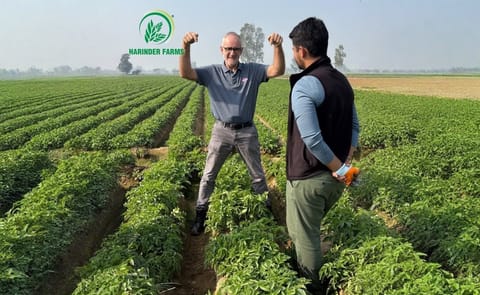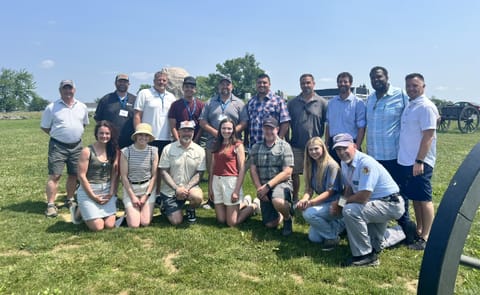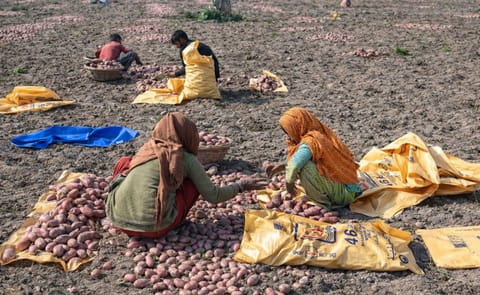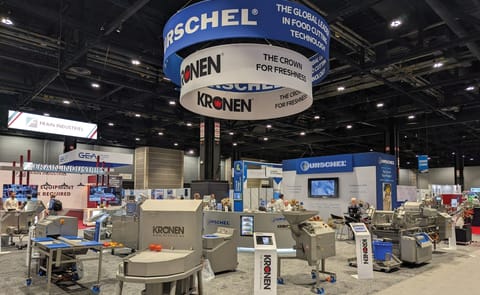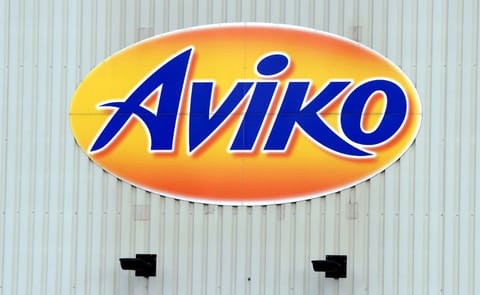Jenifer Huang McBeath of the University of Alaska Fairbanks has been researching biological controls and developing environmentally friendly methods for farmers to combat plant diseases since 1985.
This work resulted in a patent granted by many countries. She never intended to switch her focus to potatoes, but life had other plans for the Rutgers University-educated professor.
“I got sidetracked,” she said.
The detour came in 1988 when Alaska experienced an epidemic of bacterial ring rot so bad that Alaska farmers could not sell seed potatoes to buyers in other states and Canada several years. “It was a real detrimental situation,” McBeath said. “It was chaotic.”
She stepped in to help when farmers asked if she could clean up the disease that was devastating potato businesses. “You can’t grow crops without knowing what and where the diseases are,” McBeath said. Following that experience, she agreed to help farmers try to export seed potatoes. “We can’t compete with big potato states like Idaho and Washington,” she said. “The only way I could think of was to go abroad. Transportation was the equalizer.”
Born in China and raised in Taiwan, McBeath found these countries could be the best markets for Alaska potatoes because neither had accepted potatoes from foreign countries due to concerns about diseases. Her connections and language skills gave her an edge. While visiting Taiwan in 1991 to give a presentation on her biological control work to government officials, she took the opportunity to introduce Alaska seed potatoes and in 1994 Alaska was the only state that shipped seed potatoes to Taiwan. By 2003, Alaska had become the only state allowed to export seed potatoes to China, but they must be of lab tested, disease free quality.
Analyzing diseases in potatoes can be a tricky proposition, to say the least. Certification standards that work in the Lower 48 simply don’t work here due to the intense photo period, short season and cold soils that come with summer in the Interior. “The symptoms can be disguised,” McBeath explained. “Plants might look healthy because they grow so vigorously but they can carry viruses and bacteria.”
In the methods she developed, McBeath takes up to 1,000 samples from a seed lot and tests them against 11 pathogens in her lab at UAF. “The only thing that differentiates these potatoes is the lab test,” she said. “If potatoes are not tested accurately there is a high probability of repeated epidemics.” When chemicals are used to combat disease they are slow to break down in Alaska’s soils, making the for toxic conditions. McBeath asserts that tests must be done yearly to keep Alaska’s potatoes disease free. Once that is achieved for four years, crops can be exported. Already, there is an order for 100 tons of Alaska seed potatoes from China. McBeath hopes that farms can start shipping soon. Last year’s drought caused a phenomenally low yield of tested potatoes at seed potato farms, a setback for the project.
“The Chinese are watching Alaska very closely,” McBeath said. She has been to China several times to study potato diseases and has brought Chinese dignitaries to visit Alaska.
Surprisingly, the potato is one of China’s top four crops. “The potato’s position in China has been greatly elevated in recent years,” McBeath said. Not only is it a food product, but the starch is used in the plastic, fiber and pharmaceutical industries. “It’s an extremely important crop. I hope every farmer in Alaska becomes aware of the seed-growing potential.” Currently, there are only two seed potato farms in Palmer and one in Delta Junction.
A crucial element to success is the state’s simpler and cleaner environment. “All we have to do is be careful,” McBeath said. “Equipment has to be sterilized and we have to identify diseased plants and get rid of them. It is my utmost goal to keep this state pristine and help keep our environment free of pesticides.”
In addition to where spuds have taken her career, McBeath also loves them on her plate. “Growing up in Taiwan, potatoes were rare,” she said. “My father would make stew with potatoes and I said I wanted to eat potatoes all the time when I grew up.” Little did she dream where that wish would take her. “I am grateful that Alaska has given me the opportunity to grow as a scientist,” she said. “I’ve seen extraordinary things in my career.”
UAF scientist veers toward potato research when life brings a detour

Like to receive news like this by email? Join and Subscribe!
Get the latest potato industry news straight to your WhatsApp. Join the PotatoPro WhatsApp Community!
Highlighted Company
Sponsored Content
Sponsored Content
Sponsored Content
Sponsored Content



